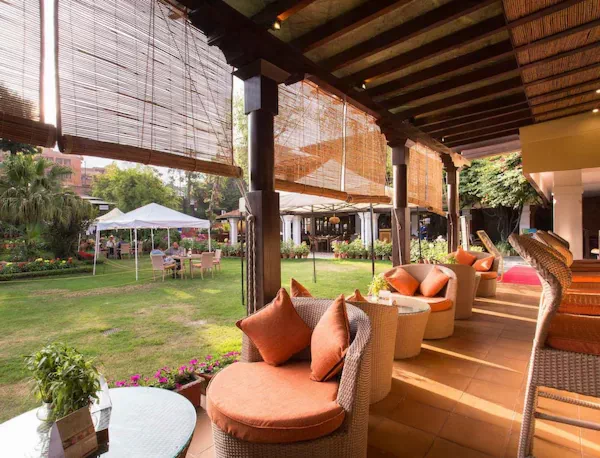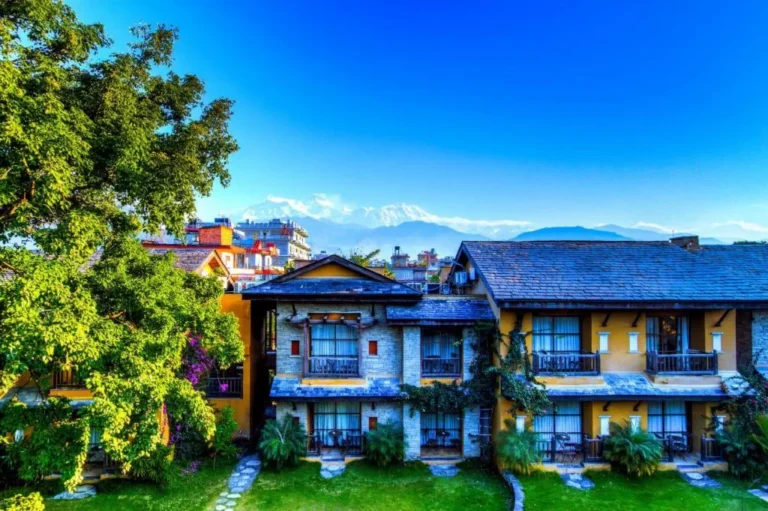Responsible/Sustainable Tourism
“Regenerative Tourism, like its predecessors, is always a journey, never a destination, so we strive to improve and achieve ever-higher levels of thriving within the natural habitat, local communities, employees, and guests who are part of the Tiger Mountain Pokhara Lodge eco-sysem” – Marcus Cotton, Mentor, Tiger Mountain
Tiger Mountain Pokhara Lodge is a sterling example for a responsible conservation driven hotel. It has set benchmarks not just in Nepal but is often looked at as a model for the Subcontinent. It follows the ethos of minimal impact on the natural environment, respect, and are working towards preserving and enhancing the bio-diversity of the area and ensuring a low carbon footprint. The lodge is independently verified on responsible practices and have an all staff forum to discuss sustainable actions and monitor results.
While building the lodge, a low ratio of room to land has been reserved and the rooms have been deliberately kept below the skyline to ensure natural horizons are maintained. There is no single use plastic used within the lodge and are currently exploring ways to assist the community with waste management – particularly plastic waste, working to liaise with the municipality and community to protect the natural environment. Bottled water in plastic is not provided and safe filtered water to drink is served. Locally sourced Ayurvedic toiletries are provided and are refillable thus doing away with single use disposable bottles. For purchasing, cloth bags or crates are used.
Waste is managed following the reduce, reuse and recycle norms. Kitchen waste is composted or used as cattle feed, and the manure is used as bio-gas. Glass bottles are sent for recycling while some are used as water bottles by guests for onward journeys. All metal and tin cans are sent for recycling as well.
Engagement with the community is one of the attributes that Tiger Mountain Pokhara Lodge has been focussed on since the beginning. There is focus on promoting a mutual understanding between cultures to help both guests and the community create a spirit of mutual respect and friendship. They have a dedicated local employee who leads their Community Support Partnership Programme; partners with the community in implementing the community vision for socio-economic development. All staff are from the local villages and the country. The Lodge works closely with the local community with focus on health, education and the local environment. The local school is supported with capital and a teacher mentoring programme. Funding has also been given for the construction of Women’s Group meeting halls, capital funding to Amar Jyoti Secondary School for expansion of school buildings and similar works. In the past, the Lodge has funded community health initiatives and supported the construction of a Red Cross hall for emergencies, training and meetings. A fair wage policy is followed.
Food is sourced locally as far as possible, with many ingredients grown in their own organic garden.
Tiger Mountain Pokhara Lodge provides an annual grant to Shiva Shakti Primary School that supports an additional teacher; and partners the school with the award-winning responsible volunteering agency, People and Places, to provide volunteer teachers to mentor local teachers and strengthen their English language and teaching skills.
Local style and materials were used in the construction design, that reflects local homes; natural cane furniture, local artefacts are used for interior aesthetics.
Wildlife and Nature Conservation is an intrinsic part of the responsible tourism practices as well. Support is given to the local community forestry committee – from financial to technical wildlife inputs to their guides. An annual grant – a combination of wayleave and donation – is provided to the Community Forest User Group (for which the Lodge is an ex officio member) for their conservation and forest management initiatives and also ensures that the lodge guides are available to assist with technical wildlife matters. The Lodge grounds are maintained in a natural way, encouraging natural vegetation and no ‘manicured lawns’. A main contribution to conservation is by data production – monitoring various species – principally waterfowl on the Pokhara Valley lakes and butterflies in the Lodge grounds.
Local activities such as village walks encourage the preservation of intangible heritage, keeping the experience authentic and sincere.


